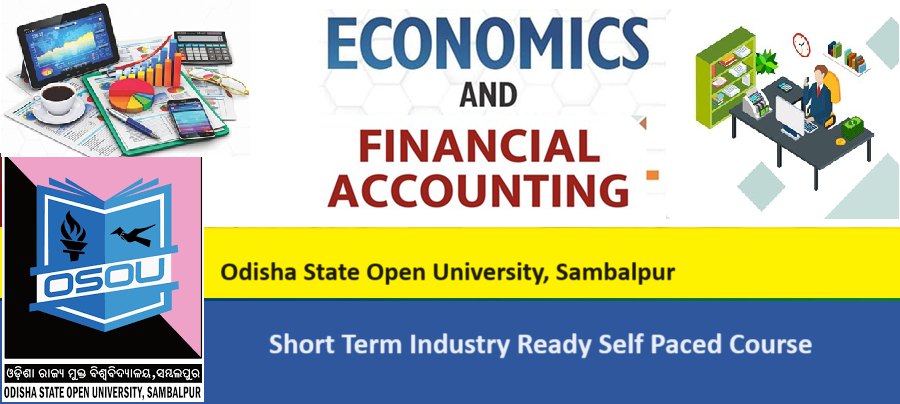

Note: Please check your Spam or Junk folder, in case you didn't receive the email with verification code.
Linear: Sequential Order
CERTIFICATION COURSES
INSTRUCTIONAL DESIGN
The university offers Online Self-paced Learning courses of about 60 hours with 4 credits each. These courses are designed to provide a comprehensive and engaging learning experience, adopting of (4) Four-Quadrant Approach i.e., eContent, eTutorials, Self-Assessments and Discussion Board.
METHODOLOGY
To ensure effective understanding, knowledge retention and practical applications, these courses use the following methodology:
1. Self-paced online course delivered with four-quadrant approach
2. Unit-wise Structured Course with
3. Modular MCQ-based Self-Assessments
4. Assignments for Practical Applications
5. 24x7 Online Community Support from Peers and Faculty
6. Periodic Live Interactive Sessions by Industry Professionals
7. Flexible Course Duration with a minimum of 1 month to a maximum of 1 year.
8. Final Examination (3 hours) after completing 60 hours of learning
a. Early Examination in limited centres near Regional Centres (RCs)
b. Regular Examination twice a year (Semester Pattern) near the students’ location.
NOTE: Not more than 4 (Four) Self-paced Online Courses can be taken concurrently.
Course Objectives
1. Understand fundamental economic concepts and their application in business
2. Develop knowledge of microeconomic and macroeconomic principles
3. Learn the basics of financial accounting and its importance in business decision-making
4. Understand financial statements and their interpretation
5. Develop skills in recording financial transactions and preparing basic financial reports
6. Understand the relationship between economics and accounting in business contexts
Course Outcomes
By the end of this course, students will be able to:
1. Apply economic concepts to analyze business situations and market conditions
2. Understand and interpret key economic indicators and their impact on business
3. Demonstrate knowledge of basic accounting principles and practices
4. Prepare and interpret basic financial statements
5. Analyze financial reports to assess a company's performance
6. Understand the role of accounting in managerial decision-making
7. Apply economic theories to explain market behaviors and business strategies
8. Understand the impact of government policies on economic conditions and business operations
9. Demonstrate basic proficiency in using accounting software for financial record-keeping
.
 Overview of economics and its relevance to business
Overview of economics and its relevance to business
 Introduction to accounting and its role in business
Introduction to accounting and its role in business
 The relationship between economics and accounting
The relationship between economics and accounting
 Assessment
5 Questions
Assessment
5 Questions
 Supply and demand analysis
Supply and demand analysis
 Market structures and competition
Market structures and competition
 Constraint satisfaction problems
Constraint satisfaction problems
 Production theory and costs
Production theory and costs
 Assessment
5 Questions
Assessment
5 Questions
 National income accounting
National income accounting
 Economic growth and business cycles
Economic growth and business cycles
 Inflation and unemployment
Inflation and unemployment
 Fiscal and monetary policy
Fiscal and monetary policy
 Assessment
5 Questions
Assessment
5 Questions
 International trade theory
International trade theory
 Exchange rates and the balance of payments
Exchange rates and the balance of payments
 Global economic institution
Global economic institution
 Assessment
5 Questions
Assessment
5 Questions
 Accounting principles and concepts
Accounting principles and concepts
 The accounting equation
The accounting equation
 Double-entry bookkeeping system
Double-entry bookkeeping system
 Assessment
5 Questions
Assessment
5 Questions
 Journal entries and T-accounts
Journal entries and T-accounts
 Adjusting entries and closing process
Adjusting entries and closing process
 Bank reconciliations
Bank reconciliations
 Petty cash management
Petty cash management
 Assessment
5 Questions
Assessment
5 Questions
 Income statement
Income statement
 Balance sheet
Balance sheet
 Cash flow statement
Cash flow statement
 Statement of changes in equity
Statement of changes in equity
 Assessment
5 Questions
Assessment
5 Questions
 Ratio analysis
Ratio analysis
 Trend analysis
Trend analysis
 Comparative analysis
Comparative analysis
 Assessment
5 Questions
Assessment
5 Questions
 Cost classification and behavior
Cost classification and behavior
 Cost-volume-profit analysis
Cost-volume-profit analysis
 Job costing and process costing
Job costing and process costing
 Assessment
5 Questions
Assessment
5 Questions
 Preparing operating budgets
Preparing operating budgets
 Cash budgets
Cash budgets
 Flexible budgets
Flexible budgets
 Assessment
5 Questions
Assessment
5 Questions
 Game theory in business decisions
Game theory in business decisions
 Pricing strategies
Pricing strategies
 Investment decisions and capital budgeting
Investment decisions and capital budgeting
 Assessment
5 Questions
Assessment
5 Questions
 Regulation and deregulation
Regulation and deregulation
 Taxation and its impact on business
Taxation and its impact on business
 Environmental economics
Environmental economics
 Assessment
5 Questions
Assessment
5 Questions
 Stock markets and bond markets
Stock markets and bond markets
 Financial intermediaries
Financial intermediaries
 Central banking and monetary policy
Central banking and monetary policy
 Assessment
5 Questions
Assessment
5 Questions
 Ethical considerations in economic decision-making
Ethical considerations in economic decision-making
 Accounting ethics and professional responsibility
Accounting ethics and professional responsibility
 Corporate governance and social responsibility
Corporate governance and social responsibility
 Assessment
5 Questions
Assessment
5 Questions
 Introduction to accounting software
Introduction to accounting software
 Economic data sources and analysis tools
Economic data sources and analysis tools
 Blockchain and its potential impact on accounting
Blockchain and its potential impact on accounting
 Assessment
5 Questions
Assessment
5 Questions
 Final Assessment
50 Questions
Final Assessment
50 Questions
The certificate issued for the Course will have
Only the e-certificate will be made available. No Hard copies. The certificates issued by ODISHA STATE OPEN UNIVERSITY. can be e-verifiable at www.ulektzskills.com/verify.



 60 hours Learning Content
60 hours Learning Content 100% online Courses
100% online Courses English Language
English Language Certifications
Certifications